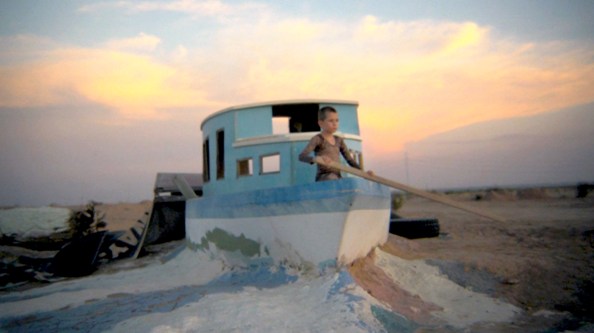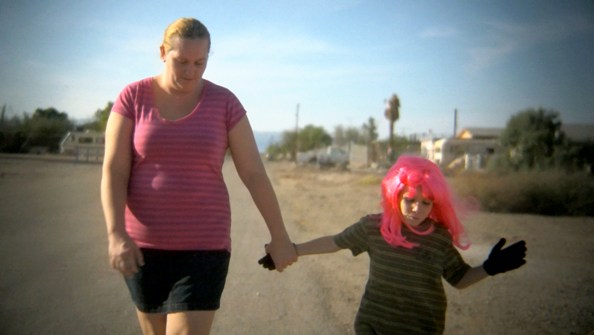After a run of disappointing films, my experience at the 28th Jerusalem Film Festival rebounded in the home stretch, where I saw three outstanding films in a row. The first of these was Israeli expat Alma Har’el’s Bombay Beach.

Bombay Beach is town in Southern California, on the shore of the Salton Sea. It was founded in the 1950’s as a resort town, but the project was unsuccessful, and today it is a small, dusty, dirt-poor town, surrounded by ghost towns. Har’el went into the town with her camera, and shows us glimpses into the lives of three of the town’s residents: a hyper-active, bi-polar seven year old; an African American teenager who escaped LA in order to avoid the violent fate of his gang-member cousin; and Red, an elderly man who used to work in the nearby oil fields, and who now survives through drinking, selling cigarettes (which he gets from a nearby Indian reservation), and offering the wisdom he’s learned in his 80 something years, not all of which is particularly wise.
It sounded like a rather depressing tale of the death (or lie) of the American dream, one which I was not anxious to check out. The strong word of mouth, in addition to the endorsement of Terry Gilliam, convinced me to go to the Thursday night midnight screening, which was added due to the overwhelming popularity of the film’s first three screenings. And what I saw was something like a masterpiece, a magnificent, luminous, human, heart-breaking and heart-mending film.

This film is visually stunning, with a beautiful, gauzy haze to it that elevates the proceedings into a kind of fantasia. Its plot suffers –this film feels like it’s happening a long time ago, or even out of time- and it doesn’t have a neat dramatic structure. But what it has instead is something far more rare. Har’el doesn’t delight in the poverty porn, and the film rarely feels exploitive of its characters considerable plights. It almost feels like we’re watching a filmmaker going on a familiar and self-serving expedition, only to discover that there is as much beauty around her as pain, if not more. In fact, the film often leaves the realm of strict documentary for staged sequences of children playing, old men thinking, and people dancing. In that, it reminded me of the documentaries of Werner Herzog, who –quite the opposite of the fly-on-the-wall esthetic- will invent facts and feed his documentary subjects’ lines in order to reach what he calls “Ecstatic Truth”, the artistic and vital alternative to factual truth. Har’el finds ecstatic truth in Bombay Beach, and has made a thing of beauty, as opposed to merely a thing of mild-interest (which is what most documentaries are).

All this is not to say that the harsh situation these people have found themselves isn’t interesting or important enough to merit being shown. Bombay Beach depicts a basic truth, missing from most documentaries –and many socially conscious fiction films, for that matter- particularly those involving righteous liberals who deign to leave their comfortable lives to depict how modern life has left for dead, people who aren’t as fortunate as them…only to return to their comfortable lives, reaping fame and awards and money to find an even more dire situation they can shed light on. These filmmakers may do some good, but one can’t help feeling a bit icky after watching 90 minutes of real people’s misery, feeling sad for a little while, then moving on with one’s life, knowing the filmmaker probably went through the same process.
Har’el does show these people’s lives, and invites us to feel sympathy and sadness and pain and desperation for them. But then she not only lets them express their hopes and dreams, but, by treating them with such gentleness –the camera caresses the subjects of this film- and by giving voice to the vibrant life that is around her, not just the decay, through dance, music, and even a fantasy sequence at the end, Har’el doesn’t allow us to feel pity for them, to feel removed or superior to them. With all of the liberties the film takes with the form, Bombay Beach may in fact be one of the purest and most noble slice-of-life documentaries seen recently, by choosing to depict the beauty and humanity of its characters, as opposed to the unforgiving nature of their predicament. At the end of the day, we the audience are coming for drama, for illumination, to be moved and entertained. To shame us for being in more fortunate situations than others is not a filmmaker’s job. Har’el’s leveling of the playing field –making her character, her audience, and herself equally human and equally containing pain and beauty- is about the best possible solution. Many documentaries pretend that we’ll become better people if we’re sufficiently shocked and depressed. I may not change my life after seeing Bombay Beach, but it made my heart grow, and small as that may sound, I don’t think one can hope for more from a film.






My sweet Alma
U know? sometimes i m thinking to my self, if there is a reason for my being in this world. If i’ll be gone, what did i contribute to mankind or people that i know or my small minor world, and now, after observing u, the things that u do and especially this unbelievable film “Bombay Beach” that u made, i think that now i know why i m here for in this cruel world. I had to be born just that i could give birth to u and through u i fulfill my dreams, and i see in u everything that i wanted to see in me but could not do it alone as u did. I thank God and thank u for being u the way u r, the sensitive person u became although u had to fight for everything u do and i know that it wasn’t easy at all. Love u and bless u and wish u all. Mom
Comments are closed.